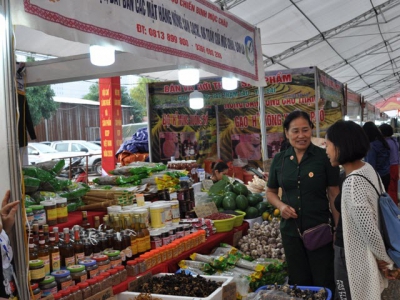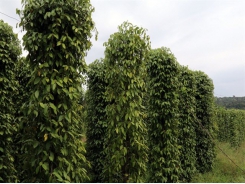OCOP program boosts agricultural specialties

Vietnam's One Commune One Product (OCOP) program has contributed to promoting production and expanding revenue for households and companies. From 2021 to 2025, the Ministry of Agriculture and Rural Development (MARD) will continue to develop OCOP products with a value chain approach, in line with local advantages and conditions.
Encouraging three-year results
According to the Central Coordination Office on New Rural Development (MARD), as of October 2020, 48 provinces and cities had participated in evaluation and classification of OCOP products. So far 2,169 OCOP products have been rated at least at 3-star standard, or 90.4 percent of the program's target for the 2018–2020 period. The Red River Delta has the most products at 712 (accounting for 32.8 percent) followed by the northern mountainous region with 497 products (22.9 percent).
Regarding the OCOP product structure, there are 1,405 products (accounting for 64.8 percent) reaching 3-star standard; 716 products (accounting for 33 percent) rated 4-stars and 48 potential 5-star products. Currently, an OCOP Council at national level is evaluating and rating 43 potential 5-star products according to proposals by 12 provinces, expecting completion in November 2020.
Since 2019, many localities have started to build up centers to introduce and promote OCOP products, organized annual trade fairs and conferences to connect supply and demand of OCOP products. The OCOP products have been displayed on e-commerce floors such as Vnpost, Voso.vn, Lazada as well as in supermarket chains of the Central Group, Aeon, Saigon Coopmart and MM Megamart Vietnam.
According to the MARD, after three years, the program has yielded encouraging results, with many products in different regions proving their value and quality, gradually forming OCOP product value chains, and contributing to production, revenues and market expansion.
Most of the products proposed for national OCOP rating have a turnover growth rate of 10-40 percent. Many have been innovated and improved in order to sell as luxury, valuable gifts in keeping with consumer trends and market demand.
Program shortcomings
Despite the results, program implementation has many shortcomings. For example, some localities only approved the OCOP Program Implementation Plan for the 2018-2020 period in 2020. The program's goals and directions are not properly and fully understood in many localities, leading to difficulties in product development.
The support policies and mechanisms are inconsistent, resulting in confusion and difficulties for localities in the implementation process. Some classification and evaluation criteria are not practical and need to be adjusted and supplemented. In addition, although OCOP products have improved quality, packaging, and labeling, many still have weaknesses, especially in the application of regulations on quality management, packaging, labels and intellectual property.
According to the MARD, in the upcoming 2021-2025 period, the ministry will continue to develop OCOP products with a value chain approach, in accordance with local advantages and conditions; build OCOP product management and monitoring systems and promote trade promotion activities for OCOP products. It will also support the application of science and technology in preliminary processing and develop typical agricultural raw material regions.
To achieve the above objectives, MARD has asked localities to conduct comprehensive evaluation of the program’s impact on the economic development of participants and rural areas; review limitations and difficulties and identify their advantages for the 2021-2025 period; continue to improve the quality of rated products, especially those in mountainous areas; and exploit the advantages of community brands and cultural values of ethnic minorities, aimed at building OCOP products as gifts and tourist souvenirs.
The OCOP was initiated by the Ministry of Agriculture and Rural Development in 2008, based on Japan’s “One
Village, One Product” and Thailand’s “One Town, One Product” programs. It is an economic development program for
rural areas and forms part of the national target program on new-style rural area building.
Related news
Tools

Phối trộn thức ăn chăn nuôi

Pha dung dịch thủy canh

Định mức cho tôm ăn

Phối trộn phân bón NPK

Xác định tỷ lệ tôm sống

Chuyển đổi đơn vị phân bón

Xác định công suất sục khí

Chuyển đổi đơn vị tôm

Tính diện tích nhà kính

Tính thể tích ao



 Long An to expand high-quality, hi-tech rice farming
Long An to expand high-quality, hi-tech rice farming  Phú Quốc develops pepper cultivation in combination with…
Phú Quốc develops pepper cultivation in combination with…